Mechanical seals
In many of the equipment installed in processing plants, there are mixers in which the agitator shaft is sealed with a mechanical seal in addition to simmering, V-ring, cord seal. Mechanical seals are used in many industries: food, pharmaceutical, chemical, pertochemical, cosmetic, gas, water and sewage, pulp and paper, metallurgy, power and heat, petrochemical and refineries. Component, compact and special seals are available.
With a variety of friction pair material configurations, the seals can be FDA approved and can be used in the food and pharmaceutical industries.
With a variety of friction pair material configurations, the seals can be ATEX approved and can be used in hazardous areas.
Advantages:
Seal reliability. In long-term operation, the seal condition is very stable and leakage is low. According to rough statistics, leakage is generally only 1 in 100 of a soft seal;
Long service life of the seal. This is generally up to 1 to 2 years or longer in oil and water media, and can usually reach more than half a year in chemical media;
Low energy consumption. The friction energy is low. The frictional force of a mechanical seal is only 10% to 50% of that of a soft seal;
The agitator shaft or sleeve is essentially free of wear;
Seal regeneration is possible. Under normal operating conditions, regular maintenance is not required;
Good vibration resistance, insensitive to vibration and deflection of the rotating shaft and shaft deflection into the sealed cavity;
Versatile and diverse in application
Possible FDA approval
Can be used in explosion-proof areas ATEX
Principal use :
Mechanical seals can be used to seal shafts in a differents types of equipment under a many types of operating conditions: both low and high temperature, vacuum, high pressure, different shaft speeds, as well as various corrosive media and media containing abrasive particles.
Across all industries: Mechanical seals are used in a many branches of industry: food, pharmaceutical, chemical, pertochemical, cosmetic, gas, water and wastewater, pulp and paper, metallurgy, power and heat, petrochemicals and refineries.
As spare parts for equipment with agitators and pumps, we offer:
mechanical seals ANGA
mechanical seals EagleBurgmann
mechanical seal John Crane
mechanical seal AESSEAL
mechanical seals Chesterton International Polska sp. z o.o.
mechanical seals Hecker
mechanical sealings CinchSeal
There are the following types of mechanical seals:
Component seals
They consist of two main components:
the rotating (dynamic) part - bolted to the machine shaft
the fixed (stationary) part - assembled in the cover or body of the machine.
Assembly requires experience and the necessary measurements to set the correct working length of the mechanical seal.








Compact seals (cartridge or cassette seals)
These seals are pre-assembled, pressure tested and ready to be installed on the machine. They are available in single or double installation. Thanks to this design, these seals are easy to install (no need to set spring preload, fewer measurements, better protection of ring sliding surfaces), maintain and replace.








Special seals
Special seals are seals that differ in design or application from other, more typical designs, such as custom PTFE seals or radial seals. They can be used, for example, in very heavy duty applications, for hot water, gas or water management.




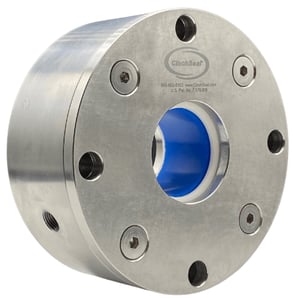

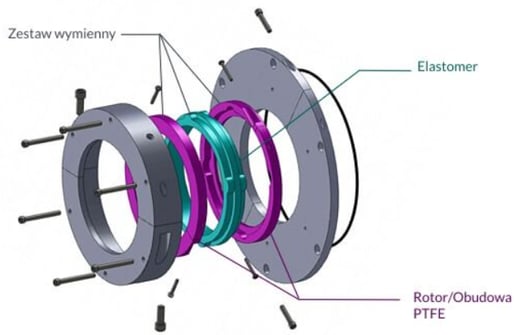

This seal consists of two parts:
a housing
an interchangeable assembly in the form of a ‘rotor’.
The sealing elastomer (green part) is placed on the rotating shaft, then covered by a housing (purple part), usually made of reinforced PTFE. The entire assembly: PTFE and elastomer form the ‘rotor’, which rotates in the housing.
The housing and the exchange kit can be in split form, which makes it easier to install the seal and quickly replace the repair kit. The housing has space for an air or nitrogen supply, which further aids sealing. The seal is formed at the point of insertion of the elastomer, which, when clamped onto the rotating shaft and placed in the PTFE housing, rotates in line with the movement of the shaft.
They are used in the food industry, e.g. in the production of chocolate products, powders, suspensions and bulk materials, in the processing, mixing and conveying of products, in the cement industry, etc.
Replacement inserts are available for each seal, made of PTFE and elastomer material. Other, more durable materials are also available. These elements are very easy to replace in installed seals.
These seals are successfully used instead of string seals.
Their application allows for:
elimination of leakage and reduction of product loss
reducing production maintenance costs
reduced damage to drives, shafts and bearings
automatically adapts to the drive shaft thanks to its unique elastomeric design
maintenance-free
designed to handle shafts operating with axial deviation (‘run-out’) of up to 0.6 cm
CinchSeal special seals for viscous products, e.g. chocolate, used in place of cord seals.
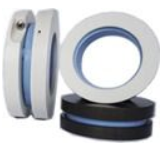

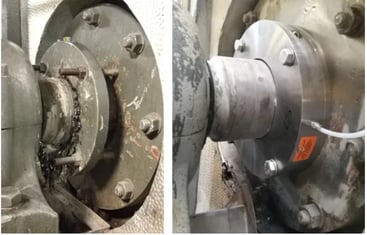

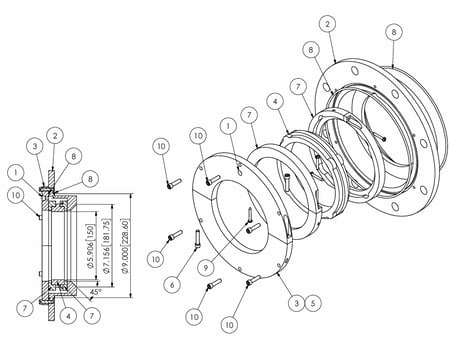

Exchangeable seal insert.
Due to the possibility of using different elastomers in mechanical seals and different materials for friction couples, it is possible to supply products with FDA approvals for contact with foodstuffs, pharmaceuticals.
Note: The occurrence of FDA approvals depends on the type of seal and the materials used in its manufacture.
